"I feel like I've broadened my horizons"
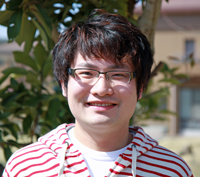
Name: Guanyi Pi
Age: 23
Nationality: Chinese
Major: Comparative Studies of Japanese Culture (Graduate School of Letters)
Hobbies: Music, movies, watching sports, shopping, travel
In this edition of "Voices," I spoke with Guanyi Pi, a graduate student from China. Guanyi studied Japanese language and culture and previously came to Japan on an exchange program during his 3rd year in university. Fascinated by Japanese culture, especially the Japanese language, he's pursuing his studies in a most uncommon area! Juggling classes, a part-time job, and a busy social life, Guanyi is yet another great example of an active international student. Find out more about his life both on- and off-campus in this edition of Voices from Abroad!
Thank you for allowing me to interview you today! Let's get started! What brings you to Japan?
When I was a junior (3rd year) at university, I went on a student exchange to Japan. I had the chance to talk to many people, hang out together, and go on trips. I made a lot of good friends, so I became really interested in Japan. I went back to China when I became a senior (4th year) and resumed my studies at Hunan University, but since the job market in China wasn't very good, I didn't want to apply for jobs right away. Plus, I really wanted to keep studying, so I came here (Japan).
I see. So why did you choose to come to Hiroshima University in particular?
I really feel like I have a connection to HU. Actually, HU's founding day (November 5) is also my birthday! I was so surprised when I saw it on the university calendar (laughs). There is also one more connection I have to the university. I'm from a place called Chongqing in China, and it turns out that Chongqing is the sister city of Hiroshima City. Also, I graduated from Hunan University, which is a partner school of Hiroshima University. So that's why I decided to come to HU after graduating in China. Actually, at first, I wasn't aiming to come to HU, but after I passed the entrance exam, I thought that it was probably a quieter place more suited to studying, so I choose HU.
Wow, sounds like you really are connected to HU! So what is Saijo like compared to your hometown of Chongqing?
Chongqing is a bustling city that's really developing, so Saijo is really quiet in comparison. But, like they say in Japanese, "Sumeba miyako" or "home is where you make it". It's been half a year since I've come to Saijo, so I've really gotten used to it. But, the one thing I can't get used to is the winter here. It's really cold, really windy, and the weather changes really dramatically (laughs).
Winters here are really harsh (laughs). Changing the subject however, could you tell me a little about your research topic?
My research topic is "fish" -- Japanese fish. For example, kanji (Chinese characters) using the "fish" radical*, or proverbs and poems relating to fish. However, right now, I'm pouring my efforts into researching maps of Japan and the names of various places to figure out why the names of places have fish names or fish-related words in them.
* Fish-radical kanji are Chinese characters made up of two characters -- the first character on the left being the kanji for "fish".
Wow, fish huh? So why did you take an interest in fish and fish-radical kanji?
It's a bit of a long story. My major at Hunan University was Japanese, but I hadn't given much thought to Japanese before I went to university. However, I did have a big interest in foreign languages. My mother is an English teacher, so I was probably influenced by that while I was growing up, and because of that, when I was accepted to Hunan University, I started to study Japanese from scratch. My professor at the time mentioned that in Japanese, there are many fish-radical kanji, and for some reason, it stuck with me. Then, when I actually went to Japan and decided to buy some groceries, I noticed that fish-radical kanji really were everywhere. It was then that I started to become interested in fish-radical kanji, and when I went back to China, I wrote my graduation thesis on the topic.
Then I came here to deepen my already existing knowledge and understanding on the topic even further. There are, of course, lots of fish-radical kanji in Chinese too, and I'd like to compare the fish-radical kanji from both countries, actually. For example, you can have the exact same kanji in Chinese and Japanese, but the meanings and nuances are slightly different.
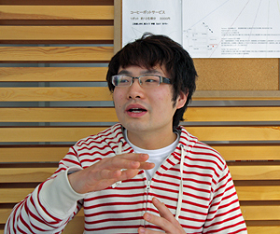
"For example..."
Wow, that's really interesting! (laughs) I know you've only been at HU for 6 months, but what is the most interesting thing you have learned in your research thus far?
Right now, I'm actually taking classes rather than doing research. Of those classes, the most interesting thing I have found is Hisashi Inoue's "The People of Kirikiri". It's a really interesting book that spans 2 days and chronicles the fictional people of Kirikiri in Sendai (northern Japan) as they try and succeed from Japan. It uses a lot of Tohoku-dialect and Mr. Inoue's ideas are really amusing. This book solves all the difficult problems facing us even today.
We started reading the story from the 4th book in our class, but I really wanted to know how it all began and how it ended, so I went and borrowed them from the library to read -- and finished them all (laughs). Actually, there are a whole lot of interesting courses in the Graduate School of Letters! For example, in my Basic Shared Culture B course, we listened to songs by the Beatles. We would listen to an entire album, pick the song we liked best, and then translate the lyrics from English to Japanese or our native tongue (Chinese, Korean, etc). We then presented our translations to the class. Since everyone is different, even the same songs were interpreted differently. Of course, this doesn't have much to do with my research topic...(laughs).
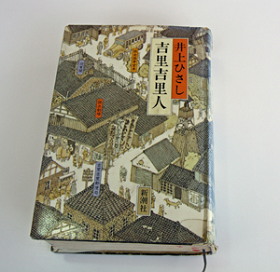
"The People of Kirikiri" by Hisashi Inoue
Sure sounds like fun though! There's nothing better than being able to study AND have fun. So, are you involved in anything outside of classes?
I'm not a member of any of the extra-curricular clubs. I like watching sports, but participating? That's another story (laughs). I don't think I have an athletic bone in my body (laughs). But, I do have a part-time job; I work the register at a nearby supermarket. When I go to work, there's one thing that customers often ask me: how do you pronounce the kanji on your nametag?* (laughs). Thanks to that however, I get to talk to the customers, and it's really a lot of fun! I always think, "I wonder how many times I'll be asked about my name today?" My boss and coworkers are really kind to me, so it's a really great job, plus, since I'm still in training, many customers encourage me, saying "do your best, trainee!" (laughs).
* The kanji for Guanyi's last name is a single kanji literally meaning "skin". This is a unique last name in Japan, where most last names are made up of two kanji, and not often is the character for "skin" used.
That's so nice of them! Are you currently living in the student dorms?
That's right. I live in the Ikenoue Dormitory. It's a little small, but it's perfect for someone like me who lives alone. It's near to campus, plus it's cheap! (laughs) The area is quiet and the air is really fresh, so I think it's a pretty good place. I have a contract to live there for a year, but I'm hoping to extend it if I can. There is a kitchen in the dorm, but honestly I often just eat out. I'll have a bento or instant ramen for lunch, and then call my friends for dinner at local ramen shops or wherever. I'm a really big ramen fan -- especially miso ramen (laughs). To be specific, my favorite is Hokkaido's Sumire Miso Ramen (laughs). Actually, when I was in Japan during my junior year, I had a part-time job at a ramen shop in Tokyo -- even working at a ramen shop, I never got sick of ramen. Our shop offered both ramen and set menu lunches, and since the customers were mainly students, I had the chance to talk to many of them, which made the job really fun. As a result of all my hard work there, they actually put me in charge of the whole place! When they gave me the keys to the store and the safe, I was really floored.
Wow, talk about your awesome jobs! (laughs) So you were living in Tokyo during your first exchange visit to Japan?
That's right.
I'm sure Tokyo is very different from Saijo -- which do you like better?
Like I said before, "Home is where you make it", and now my home is Saijo. If I want to go shopping, the city is really close, and I was even able to work at an internship in Hiroshima City at Hiroshima Bank. There, I toured various facilities and received hands-on training. I had previously thought of banks as just counter-side service, but I studied other jobs (clerical work, etc), and got to see a side of banks that most people don't (the bank vault, packs of 100 million yen, etc). It was pretty wild (laughs).
There was also a tour of the heart of Hiroshima Bank: their computer center. Now THAT was wild! There were hundreds of computers in a large room, but not a single staff member around. All of the computers acted automatically. Now I'm an Arts and Humanities guy, so seeing all of those computers was really impressive and surprising.
I was also touched by the true kindness of all of the bank staff members. They always greeted me with a smile that never faded. The internship was in February, and even though it was really cold, seeing their smiling faces always warmed me right up. We also learned about currency exchanges and loans, and at the training site, we opened accounts, filled out paperwork, conducted bank transfers hands-on -- it was a great experience. Thanks to the internship, I was also able to make friends with the Korean students who participated, and now we're teaching each other Chinese and Korean (laughs).
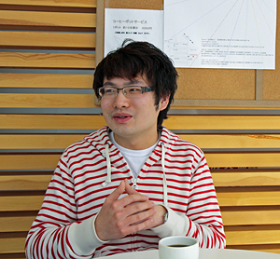
"Home is where you make it"
Sounds like an unforgettable experience! It's only been 6 months and yet you're involved in classes, a part-time job, and even an internship! Talk about busy! (laughs) It might be a bit early to ask, but what do you plan to do upon graduation?
I'd like to continue my studies and get my Doctoral degree, and then become a Japanese teacher at a university. After all, Japanese is my major, and I really like interacting with others. If I'm a teacher, I can interact with different students, which sounds like fun to me. However, thanks to last month's internship, I was able to experience a more "scientific" type of work, and I feel as if another door has opened up for me. I learned that even if you don't have financial or economic knowledge, you can still do the work needed for the bank. It's like a whole other option opened up for me (laughs).
I've been in the arts and humanities track since high school, so I'm not too great with science or numbers -- I just don't have the knowledge for it. That's why I always thought that in the future, I'd become a teacher or a public servant. Thanks to the internship, however, another road has opened up for me. What really surprised me the most about my internship was that most of the staff there were from arts and humanities or law disciplines, not economics.
I met many staff members who began from scratch, took to the environment, and work hard every day. It led me to think that I might be able to be active in wider areas, not limited to just arts and humanities. I really feel like I've broadened my horizons.
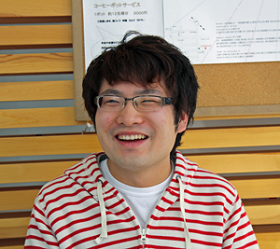
"I really feel like I've broadened my horizons!"
What a great experience. Finally, I'd like to ask if you have any advice for students who want to study here at HU?
Hiroshima University is the perfect place for students who have come to Japan before, or who are coming for their first time. I'm really glad that I came here. It's a quiet place where you can get lots of studying done, so definitely come and see for yourself (laughs).
Thank you so much, and good luck with your studies!
Thank you!
Photo Gallery
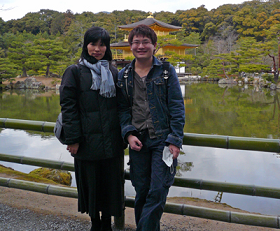
At Kinkakuji Temple in Kyoto.
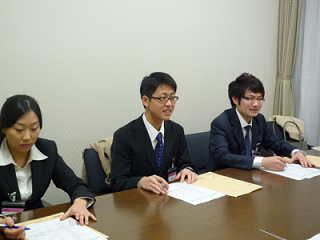
At the Hiroshima Bank internship.
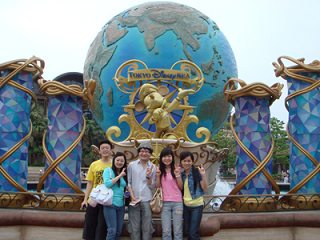
At Disney Sea with friends.
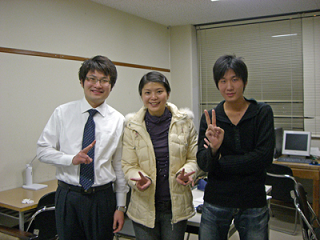
With fellow lab members.


 Home
Home